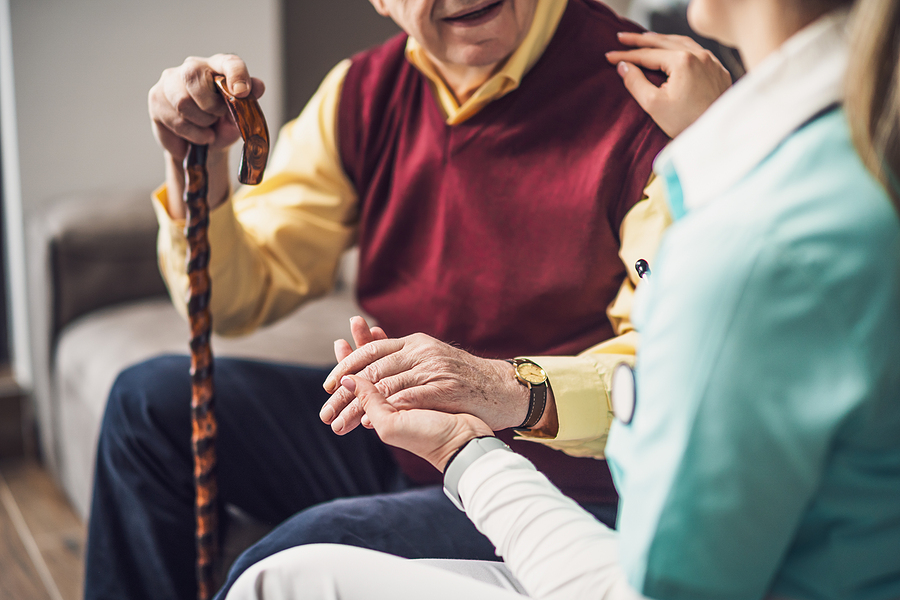Has your loved one recently been diagnosed with Parkinson’s disease? Living with or caring for someone with Parkinson’s can be challenging, but arming yourself with knowledge and understanding can make all the difference.
In this blog post, we’ll explore the world of Parkinson’s disease, shedding light on its symptoms, treatments, ongoing research, and ways to support loved ones. Our goal is to empower you with information, hope, and practical advice to help navigate the journey with strength and positivity. We will also cover how memory care communities take a unique approach to helping families and individuals who have been affected by Parkinson’s disease.
What Is Parkinson’s Disease and What Are the Symptoms?
Parkinson’s disease (PD) is a progressive neurological disorder that affects movement and coordination. It occurs when nerve cells in the brain called neurons gradually break down, leading to a decline in the production of the chemical dopamine. Dopamine is essential for smooth, coordinated movement, and a shortage of this neurotransmitter results in the characteristic symptoms of PD.
Parkinson’s is the second most common neurodegenerative disorder, affecting approximately 10 million people worldwide [1]. It is more common in individuals over the age of 60, although early-onset PD can affect younger people as well.
The symptoms of PD vary from person to person and can be classified into motor and non-motor symptoms. The main motor symptoms include:
- Tremors: Involuntary shaking or trembling, usually starting in one hand and sometimes spreading to other body parts
- Rigidity: Stiffness and resistance to movement in the muscles
- Bradykinesia: Slowness of movement, making it difficult to perform everyday tasks
- Postural instability: Impaired balance and coordination, which can lead to falls
Non-motor symptoms may include cognitive changes, depression, anxiety, sleep disturbances, and gastrointestinal issues [2].
How Is Parkinson’s Disease Treated?
While there is no cure for Parkinson’s, various treatments are available to manage the symptoms and improve the quality of life for those affected. Treatment options include medication, physical therapy, and surgical interventions, depending on the individual’s needs and the severity of the symptoms.
- Medications: The most common medication used for PD is levodopa, which is converted into dopamine in the brain. Other medications, such as dopamine agonists, MAO-B inhibitors, and COMT inhibitors, can also be prescribed to help manage symptoms [3].
- Physical therapy: Exercise and physical therapy can help improve mobility, balance, and muscle strength. Tailored exercise programs can also help with managing symptoms and maintaining independence. Many memory care communities, including Springpoint at Manalapan, offer this service as part of their memory care program.
- Surgical interventions: For individuals with advanced PD or those who do not respond well to medications, deep brain stimulation (DBS) may be considered. DBS involves implanting electrodes into specific brain areas to help control motor symptoms [4].
What Research Is Being Done to Find a Cure for Parkinson’s Disease?
Researchers worldwide are tirelessly working to find a cure for Parkinson’s disease, with various promising avenues being explored. Some of the current research focuses include:
- Developing new medications and drug delivery methods to manage symptoms better and slow the progression of the disease [5].
- Investigating the potential of stem cell therapies to replace damaged dopamine-producing neurons [6].
- Studying the role of genetics in PD to identify potential targets for early intervention and personalized treatments [7].
How Can You Help Support Someone Who Has Parkinson’s Disease?
Supporting a loved one with Parkinson’s disease is a unique journey, but there are many ways you can help:
- Educate yourself about the disease and its treatments to better understand your loved one’s needs and challenges.
- Encourage exercise and physical therapy, as they can help maintain mobility and independence.
- Provide emotional support and reassurance, as depression and anxiety are common non-motor symptoms of PD.
- Assist with daily tasks and offer help when needed while respecting their autonomy and independence.
- Join a local or online support group to connect with others facing similar challenges and share experiences, advice, and resources.
- Consider helping them find a place to thrive by researching senior living communities near you.
Resources for Further Information About Parkinson’s Disease
Educating yourself about Parkinson’s Disease is crucial for providing the best support to a loved one with PD. The following resources offer valuable information, support, and guidance:
- Parkinson’s Foundation [8]: This organization offers comprehensive information about PD, its symptoms, treatments, and research advancements. It also provides resources for people living with the disease and their caregivers, including support groups and educational events.
- Michael J. Fox Foundation for Parkinson’s Research [9]: This foundation is dedicated to finding a cure for PD and developing improved therapies for those living with the disease. They offer in-depth information about research, treatments, and ways to get involved in clinical trials.
- American Parkinson Disease Association [10]: This association provides extensive resources for people with PD, their families, and healthcare professionals, including educational materials, support groups, and wellness programs.
- National Institute of Neurological Disorders and Stroke [11]: This government website offers information about PD, its symptoms, treatments, and the latest research.
Memory Care Communities
Memory care communities play a crucial role in addressing the unique needs of individuals with Parkinson’s disease, providing specialized treatment and care within a supportive and compassionate environment. These communities are staffed by dedicated professionals trained in managing the cognitive and physical symptoms of Parkinson’s disease, ensuring that residents receive the personalized attention they need. Care plans are carefully designed to promote independence, mental stimulation, and physical well-being, while also taking into account each individual’s preferences and abilities. With a focus on fostering a sense of belonging and creating a nurturing atmosphere, memory care communities strive to improve the quality of life for those living with Parkinson’s disease, offering peace of mind to both residents and their families.
Wrapping Up
In conclusion, understanding Parkinson’s disease, its symptoms, and available treatments is vital for those living with the condition and their caregivers. With ongoing research, there is hope for new therapies and potential cures. By educating ourselves, supporting our loved ones, and taking advantage of support provided by online resources and memory care communities, we can help navigate the challenges that PD presents and preserve our loved one’s quality of life.
As you continue to learn about Parkinson’s disease and seek resources to support your loved one, consider reaching out to the caring professionals here at Springpoint at Manalapan. Our compassionate memory care community is dedicated to providing top-notch care and services tailored to the unique needs of individuals with Parkinson’s disease. Call us today at 1-833-754-2167 or contact us to discuss how we can support you and your loved one on this journey.
References
- Parkinson’s Foundation. (n.d.). Statistics. Retrieved from https://www.parkinson.org/Understanding-Parkinsons/Statistics
- Parkinson’s Foundation. (n.d.). Symptoms. Retrieved from https://www.parkinson.org/Understanding-Parkinsons/Symptoms
- Parkinson’s Foundation. (n.d.). Medications for Motor Symptoms. Retrieved from https://www.michaeljfox.org/grant/dry-powder-based-delivery-intrapulmonary-levodopa-treatment-motor-fluctuations-parkinsons
- Parkinson’s Foundation. (n.d.). Surgical Treatment Options. Retrieved from https://www.parkinson.org/Understanding-Parkinsons/Treatment/Surgical-Treatment-Options
- The Michael J. Fox Foundation for Parkinson’s Research. (n.d.). Promising Parkinson’s Therapies and Research. Retrieved from https://www.michaeljfox.org/news/filling-out-roster-parkinsons-disease-therapies
- Parkinson’s Foundation. (n.d.). Stem Cells. Retrieved from https://www.parkinson.org/library/podcast/17
- National Institute of Neurological Disorders and Stroke. (n.d.). Parkinson’s Disease Information Page. Retrieved from https://www.ninds.nih.gov/health-information/disorders/parkinsons-disease
- https://www.parkinson.org/
- https://www.michaeljfox.org/
- https://www.apdaparkinson.org/
- https://www.ninds.nih.gov/health-information/disorders/parkinsons-disease



